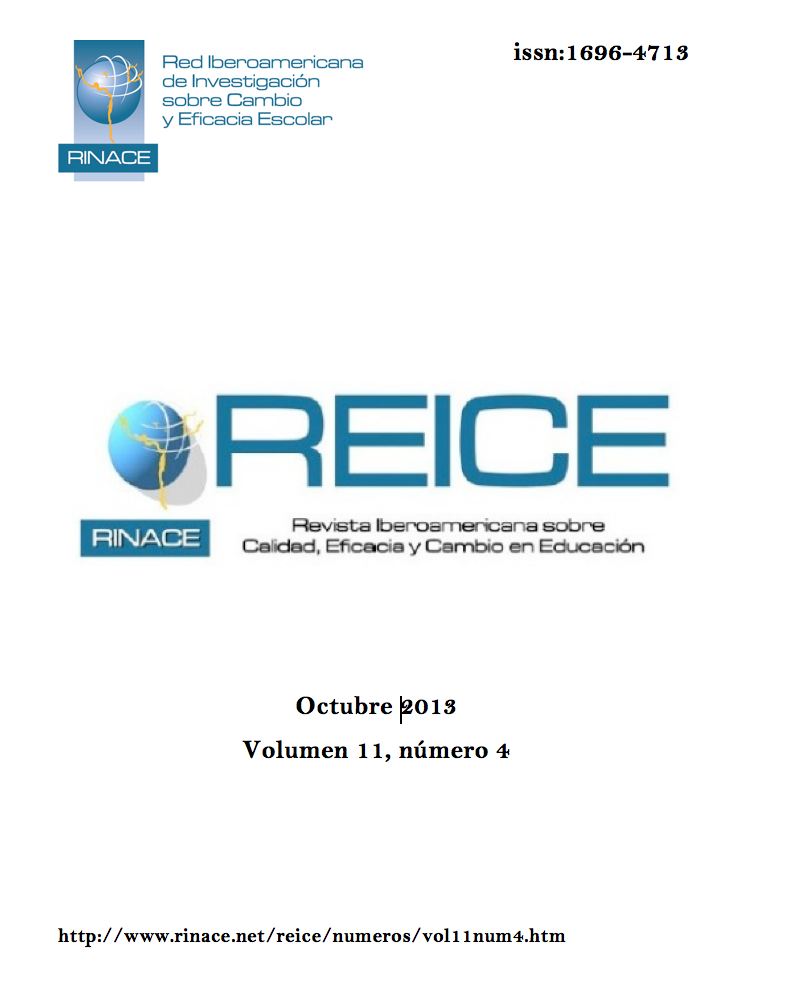External Evaluations and Innovative Projects in Education: Who and What are They for?
Keywords:
External Evaluations, Innovational projects, Educational Coordinator, Prize, Public politics.Copyright (c) 2023 REICE. Revista Iberoamericana sobre Calidad, Eficacia y Cambio en Educación

This work is licensed under a Creative Commons Attribution-NonCommercial-NoDerivatives 4.0 International License.
Abstract
This study was constructed from the analysis of projects developed in five municipal public education networks in the State of São Paulo, Brazil, that were awarded by the federal Government, through the Laboratório de Experiências Inovadoras em Gestão Educacional as innovative experiences. The investigation involves the participation of educational coordinators of educational units that were instigated, through a questionnaire, to demonstrate on the decisions that they take from the dissemination of the results of students ' performance in large-scale external evaluations. Is structured in the description of the survey and characteristics of federal award for innovation in educational management and goes searching for unfold the representations of the pedagogical coordinators on the use of the data by the professionals of the educational unit in its pedagogical do. In continuity, discusses the various effects of large-scale external evaluations and, finally, brings considerations need to continue the debate on relations between public policy on education that use of awards and the impact of that policy on the improvement of the public school.Downloads
References
Brasil, (2012). Mec/Inep. Prêmio Inovação em Gestão Educacional 2006. Experiências selecionadas. Disponible en http://www.publicacoes.inep.gov.br/detalhes.asp?pub=4151
Carbonell, J. (2002). A aventura de inovar: a mudança na escola. Porto Alegre: Artmed.
Esteban, M.T. (2003). A avaliação no cotidiano escolar. En M.T. Esteban, Avaliação: uma prática em busca de novos sentidos (pp.7-28). Rio de Janeiro: DP&A.
Fernandes, D. (2009). Avaliar para Aprender: fundamentos, práticas e políticas. São Paulo: UNESP.
Franco, M. (2005). Pressupostos epistemológicos da avaliação educacional. En C.P. Sousa, Avaliação do Rendimento Escolar (pp.13-26). Campinas: Papirus.
Freitas, L.C. (2007). Qualidade negociada: avaliação e contra-regulação na escola pública. Educação & Sociedade, 26(92), 911-933.
Freitas, L.C. Sordi, M.R.L., Malavasi, M.M.S. y Freitas, H. (2009). Avaliação Educacional. Caminhando pela contramão. Petropolis: Vozes.
Freitas, L.C. (2011, Julho). Os reformadores empresariais da educação: a consolidação do neotecnicismo no Brasil. Comunicación presentada en el 10º Encontro de Pesquisa em Educação da Região Sudeste. Rio de Janeiro, Brasil.
Luckesi, C. (2003). Avaliação da aprendizagem escolar. São Paulo: Cortez.
Pacheco. J.A. (2011). Currículo e gestão escolar no contexto das políticas educacionais. Revista Brasileira de Políticas Avaliação Educacional, 27(3), 361-588.
Ravitch, D. (2010). The death and life of the great American School System. Nueva York: Basic Books.
Saviani, D. (1986). Escola e Democracia. São Paulo: Cortez.
Skinner, B.F. (1967). Ciência e comportamento humano. Brasilia: Universidade Brasilia.
Sacristán, J.G. (2000). A avaliação no ensino. En J.G. Sacristán, A.I.P. Gómez, Compreender e transformar o ensino (pp.295-351). Porto Alegre: ArtMed.
Santos, B.M. (2005). A gramática do tempo. Para uma nova cultura política. São Paulo: Cortez.
Sordi, M.R.L. y Silva, M.M. (2009). Avaliação institucional no ensino fundamental: o orientador pedagógico como articulador do coletivo escolar. Revista Iberoamericana de Evaluación Educativa, 2(2), 46-58.
Sousa, S.Z.L. (2005). Revisando a teoria da avaliação da aprendizagem. En C.P. Sousa, Avaliação do Rendimento Escolar (pp. 27-50). Campinas: Papirus.
Torres, R.M. (1998). Melhorar a qualidade da educação básica? As estratégias do Banco Mundial. En L. Tomasi, L. M.J. de Warde y S. Haddad, O Banco Mundial e as Políticas Educacionais (pp. 93-125). São Paulo: Cortez.
